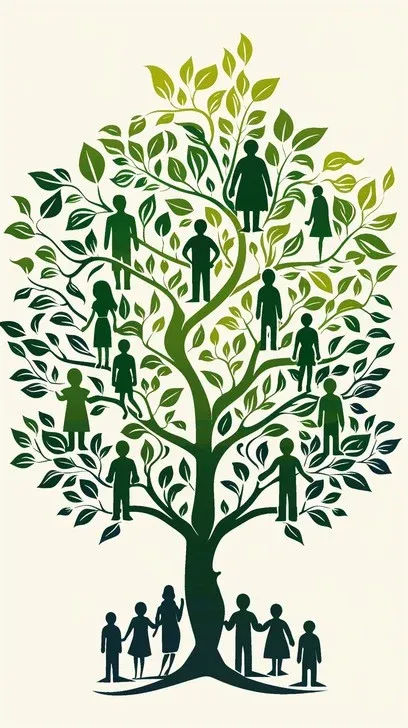
Our Blog
Breaking the Cycle: Healing Generational Trauma for Lasting Family Well-being
Recognizing, Understanding and Healing from generational trauma.


Breaking the Cycle: Healing Generational Trauma for Lasting Family Well-being
Introduction: Unpacking the Invisible Inheritance
Have you ever wondered why certain patterns, fears, or coping mechanisms seem to repeat themselves across generations in your family, even if they don’t seem to originate from your direct experiences? This phenomenon is often attributed to generational trauma – a silent, invisible inheritance passed down through families that can impact individuals and communities for decades, even centuries. From historical events like war, famine, and systemic oppression to more personal experiences like abuse, neglect, or profound loss, the echoes of past suffering can profoundly shape present-day realities. Understanding generational trauma is the first step toward breaking its insidious hold and fostering a future of healing and resilience.
What is Generational Trauma?
Generational trauma refers to the psychological and emotional impact that traumatic experiences have on subsequent generations, even if they did not directly experience the original trauma. It’s not just about inherited memories; it’s about the very real biological, psychological, and social adaptations that families develop in response to profound stress.
The Science Behind the Inheritance
Recent research in epigenetics suggests that trauma can indeed alter gene expression, meaning that the way our genes function can be influenced by our ancestors’ experiences. These changes can be passed down, making descendants more susceptible to stress, anxiety, and other mental health challenges. Beyond biology, the way families communicate, interact, and cope with emotions – or avoid them – also plays a significant role in transmitting trauma.
Common Manifestations
Generational trauma can manifest in various ways, often subtly interwoven into daily life. These include:
- Emotional Dysregulation: Difficulty managing emotions, leading to outbursts or emotional numbness.
- Anxiety and Depression: Chronic feelings of worry, sadness, or hopelessness that seem disproportionate to current circumstances.
- Relationship Challenges: Difficulty forming secure attachments, patterns of dysfunctional relationships, or avoidance of intimacy.
- Coping Mechanisms: Substance abuse, perfectionism, people-pleasing, or self-sabotage as ways to manage unresolved pain.
- Physical Symptoms: Chronic pain, fatigue, or unexplained illnesses.
Recognizing the Signs in Your Family
Identifying generational trauma requires introspection and a willingness to explore family history.
Tracing the Roots
Look for recurring patterns in your family narratives, behaviors, and health issues. Were there significant historical events that impacted your ancestors (e.g., wars, displacement, discrimination)? Did previous generations experience profound loss, abuse, or poverty?\
- Family Stories: Pay attention to stories passed down, even those that seem fragmented or unspoken. What were the unspoken rules or burdens in your family?
- Behavioral Patterns: Observe recurring patterns in how family members cope with stress, express emotions, or relate to others.
- Physical Health: Explore any unexplained chronic health conditions that seem to run in the family.
Unpacking the Legacy
Understanding that these patterns are not personal failings but rather adaptive responses to past hardships can be incredibly liberating. It shifts the narrative from blame to compassion and understanding.
Getting Help: Pathways to Healing
Breaking the cycle of generational trauma is a courageous act of self-love and familial responsibility. It requires professional support and a commitment to healing.
Therapy and Counseling
Various therapeutic approaches are highly effective in addressing generational trauma:
- Trauma-Informed Therapy: Focuses on understanding how past trauma impacts current functioning and helps individuals develop coping strategies.
- Family Systems Therapy: Explores family dynamics and communication patterns to identify and address underlying issues.
- Eye Movement Desensitization and Reprocessing (EMDR): A therapy designed to help individuals process traumatic memories.
- Somatic Experiencing: Focuses on releasing trauma stored in the body.
- Energy Healing through modalities such as Reiki, sound bowl, and enegry clearing practices
Community and Support Groups
Connecting with others who have similar experiences can provide validation, reduce isolation, and offer valuable insights. Support groups focused on trauma, addiction, or specific historical traumas can be incredibly beneficial.
Holistic Approaches
Alongside professional therapy, incorporating holistic practices can support the healing process:
- Mindfulness and Meditation: Helps regulate the nervous system and increase self-awareness.
- Yoga and Movement: Releases tension and promotes body-mind connection.
- Creative Expression: Art, writing, or music can be powerful outlets for processing emotions.
Lasting Benefits: A Legacy of Well-being
The effort invested in healing generational trauma yields profound and lasting benefits, not just for the individual but for entire families and future generations.
For Individuals
- Increased Self-Awareness: A deeper understanding of one’s own emotional landscape and triggers.
- Improved Emotional Regulation: The ability to manage and express emotions in healthy ways.
- Healthier Relationships: Forming more secure and fulfilling connections with others.
- Enhanced Resilience: The capacity to navigate life’s challenges with greater strength and adaptability.
For Families
- Breaking Destructive Patterns: Stopping the transmission of unhealthy coping mechanisms.
- Improved Communication: Fostering open, honest, and empathetic dialogue.
- Stronger Bonds: Creating a more supportive and understanding family environment.
- Cultivating New Legacies: Building a legacy of healing, emotional intelligence, and resilience for future generations.
For Future Generations
By doing the work to heal your own trauma, you are actively re-writing the narrative for your children and grandchildren. You are gifting them with:\
- Emotional Freedom: Less likely to carry the same burdens and patterns.
- Increased Opportunities: Free to pursue their potential without the constraints of inherited trauma.
- A Foundation of Well-being: A family environment rooted in health, empathy, and connection.
Conclusion: A Journey of Hope and Transformation
Generational trauma is a powerful force, but it does not have to define your destiny or the destiny of your family. Recognizing its existence, seeking professional help, and committing to a journey of healing can transform not only your own life but also the lives of those who come after you. It is a testament to the human spirit’s capacity for resilience and a profound act of love for future generations. By courageously addressing the echoes of the past, we can collectively forge a future where families thrive, breaking the cycle of pain and building a legacy of lasting well-being.
You don’t have to do this alone. Schedule a FREE consultation to start your healing journey today.



